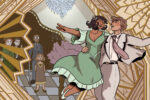While some classic literature has become dated as the years have progressed — for example, “Gone With the Wind” and its portrayal of slavery and the antebellum South — there are still those works that remain ageless due their universal themes. Ideas such as tragic love, existential fears, portrayals of the afterlife and very possible dystopian futures pervade classic literature. Although the times and settings of some of these well-known books might have changed, the emotional connection readers share with these classic works remain.
Even aside from providing enjoyment, epics like “Gilgamesh” and Homer’s “Odyssey” give readers a glimpse into the past; they not only entertain with their writing style, but they offer their own interpretation of life in ancient times by showcasing how those in bygone eras lived and what they believed in and why. Not all literature will be historically accurate, but much of classic literature will at least give some insight about what life used to be like.
This leads to another purpose for some classic literature: It can capture the values from certain cultures, time periods and realities, and in the process, teach us something about our current epoch. A fine example of this is George Orwell’s famous dystopian novel, “1984,” a classic that bleakly tells the tale of a government that depends on 24-hours surveillance, false facts and nonexistent wars in order to keep civilians in line. People are technically able to choose between this and what is truly reality, but only if they wish to lose their freedom and sanity as well.
Orwell was able to capture the idea of an all-too powerful and frightening government based on his own experiences with war and authoritarian governments in the 1930s and ’40s. For those who have read the book, chew on this: How different is the fictional character of Big Brother and real-life dictator Adolf Hitler?
Consider also that some literature remain classics due to the universality of their themes. Briefly mentioned above, readers can grasp classic literature because it contains timeless ideas applicable to anyone, regardless of age or place.
Whether it be stories that involve racial or gender discrimination (“To Kill a Mockingbird” with its themes of bigotry and injustice under the law), religious subjugation, shaming a person’s sexuality, policing someone’s supposed promiscuity (“The Scarlet Letter,” a novel that also explores themes of guilt, revenge and redemption in Colonial America), mental health (“The Bell Jar,” poet Sylvia Plath’s tension-inducing and realistic semi-autobiographical novel about a college-aged woman’s struggle with depression), or just different general aspects of daily life (“The Great Gatsby” and its themes of wanting to recapture the past), classics help readers understand contemporary issues through different points of view.
Even if some of these topics have been looked at in different ways, it is still quite intriguing to see what these issues were like during different times and what was done about them, conjuring up more than hundreds of different meanings and interpretations, making works of classic literature all the more timeless.
There are plenty of classic pieces of work out there that deserve a read, but there are also those that may have become a tad dated. The aforementioned “Gone with the Wind“ provides a very antiquated view of slavery and the South during the American Civil War; then there are the young adult novels such as S.E. Hinton’s “The Outsiders and J.D. Salinger’s “The Catcher in the Rye,” a couple early examples of literature that explore teen angst and rebellion.
Hinton’s work did not receive much of the praise Salinger’s gained, but it is still considered a great work of fiction, perhaps only hampered by its now-outdated slang and the way women are described in the book (though any derogatory language towards them, if any, is subtle since the only thing that really sticks out is the way the protagonist describes and compares girls from the upper class and the ones from the lower class that he is more familiar with). “The Catcher in the Rye,” on the other hand, has aged more poorly with the “struggles” of the protagonist, Holden Caulfield, being better described as First World Problems. It is safe to say that young adult fiction has evolved since the 1950s, with teenagers being able to catch a glimpse of characters close to their age going through more relatable problems.
Regardless, classic novels have captured topics and forms of reality for each successive generation to figure out and discuss. They each tell a story that everyone needs to hear or read. Classic literature is still relevant today because it is able to give readers certain insights by giving a glimpse into the past and sharing its input on issues that have stayed as universal and timeless as they have.
















